In the centre of a Venn diagram linking climate change to the mystic landscape of Dartmoor and the West Country, sits this tightly conceived show about "green" witchcraft in contemporary art. Witches were once very common in this part of the world; the last witch to be executed in Britain was from Exeter. The local museum has invited a selection of artists to contemplate this local history and the result has brought the dark arts into the light of a 21st-century space for art.
Of the four artists who have been invited to engage with the collection at the Royal Albert Memorial Museum & Art Gallery (RAMM), it is Lucy Stein (main picture) who appears the most open to influence. Her display of large, loose figurative paintings in wild colours is mixed up with votive offerings, snail shells, and an ammonite fossil, all from the museum holdings, which anchor her works from behind glass. The spiral form is echoed by a sculptural piece, Goddess Pedestal/Library Steps, 2022. One could climb up this found furniture to reach for a book or a thunderbolt from the heavens; it’s splashy, expressionistic colours bestow a unity on the rest of the artist’s work.
Florence Peake has been on a journey of her own which took her to a rocky outcrop of Dartmoor where she gave herself over to a healing ritual with a local shaman. Her response is a mixed media installation comprising of ceramic, veils and compact monitor screens, In The Lichen Exists I, 2021-22 (pictured below), she uses a poetic text to transport her beyond the present. Her film Ferocious Match, 2020, finds her dancing like a maenad in a red dress and a thunder storm; it’s a frenzy which holds little back. The dim graininess of the picture conveys the authentic strangeness of her convulsive movements.
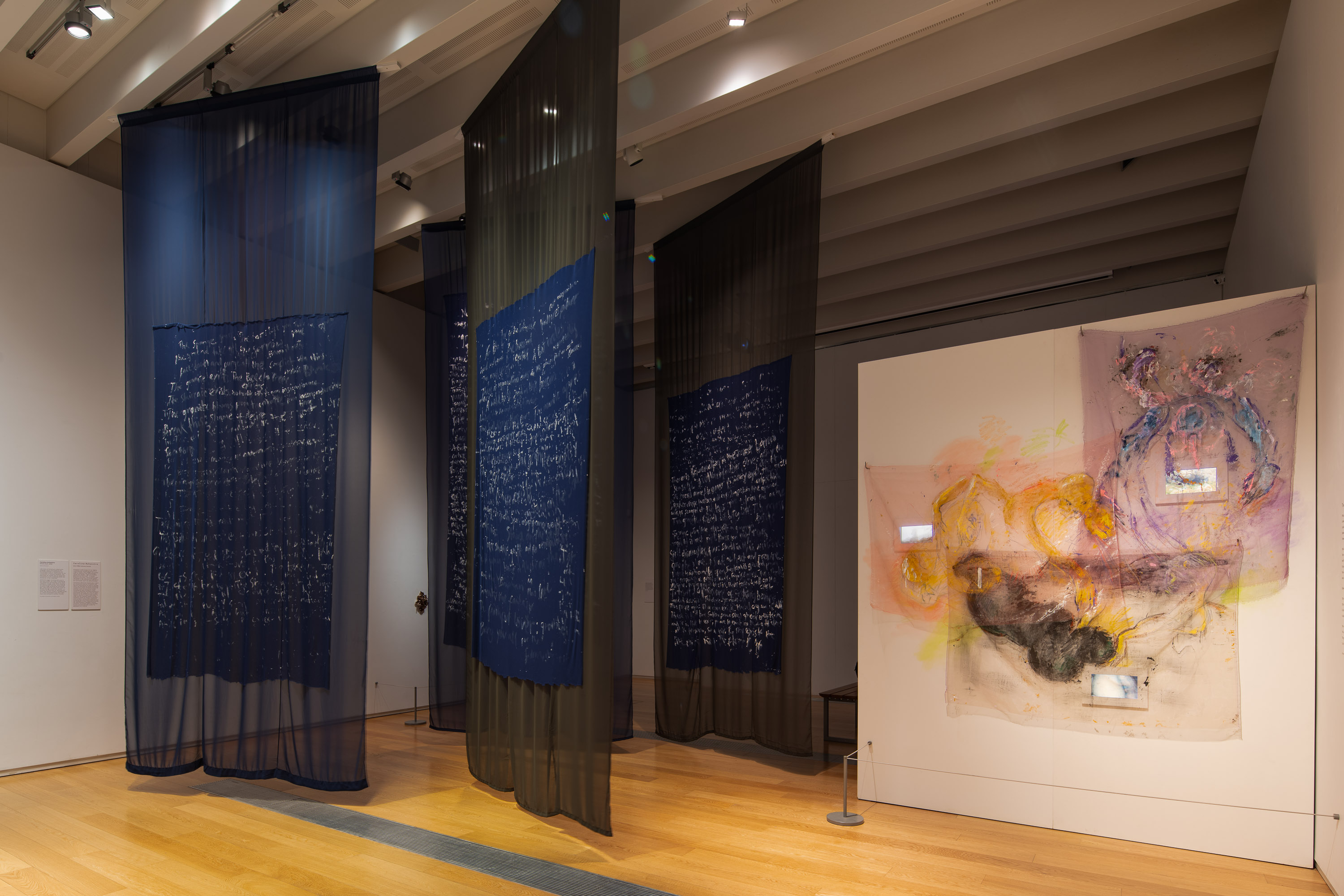 A third commissioned artist, Grace Ndiritu is herself a shamen, whose intervention here at RAMM took the form of a performance. Ndiritu is a more measured performer, beating out time on a bodhran as she moves around a circle of local volunteers, who are all heavily pregnant women looking for spirit names for their children. The museum is a familiar setting for a ritual which is non-threatening and non-occult. It is the show’s strongest expression of the benign, healing powers that witchcraft can offer.
A third commissioned artist, Grace Ndiritu is herself a shamen, whose intervention here at RAMM took the form of a performance. Ndiritu is a more measured performer, beating out time on a bodhran as she moves around a circle of local volunteers, who are all heavily pregnant women looking for spirit names for their children. The museum is a familiar setting for a ritual which is non-threatening and non-occult. It is the show’s strongest expression of the benign, healing powers that witchcraft can offer.
It is important to note that the impetus for Earth Spells comes from the life of Elizabeth Webb, who was Dartmoor’s self-styled white witch. RAMM has acquired her black cauldron, which is smaller than you might expect from the job description, but no less imbued with presence. Each of the four commissioned artists was invited to Exeter to see the collection and handle this object. As a result, witches, who have long been the victims of lethal hunts and incomprehending misogyny, get a decent press here.
The fourth new commission is the work of offbeat ceramicist Emma Hart, who has made thirteen new pieces to represent the number of witches in a coven. The result is a bright array of relief targets which affix to the wall, each one the size of a large dinner plate. However, the rings of each of these targets appear to slip southwards as if to indicate, perhaps, that polite society may take aim at witches and witchery, but that the duckings, hangings, and burnings, were only ever grave miscarriages of justice.
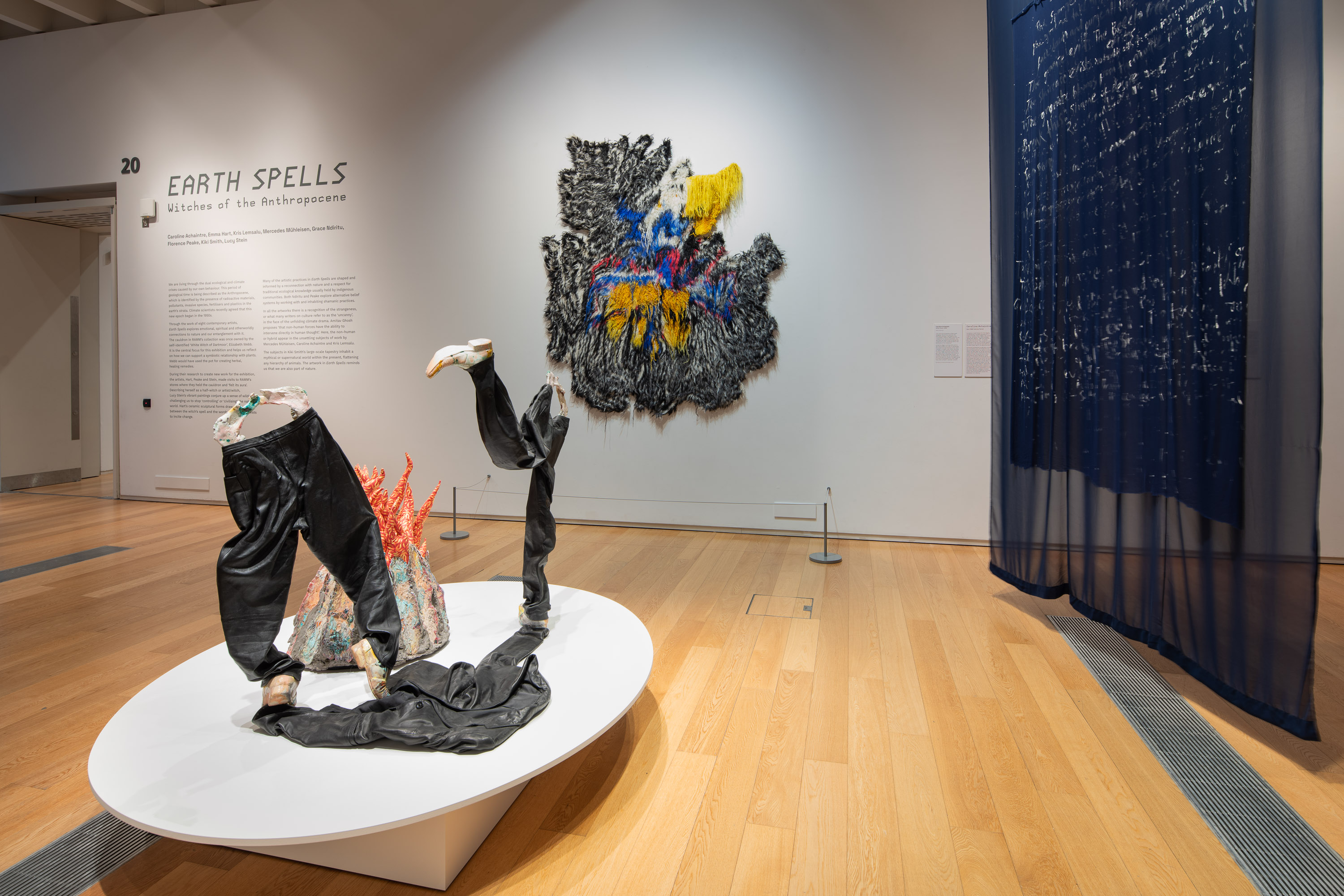 RAMM’s new commissions are augmented by works by a number of other spellbinding artists. Kiki Smith is represented by a tapestry showing a fox in the woods, together with a suite of drawings which show cross sections of trees. Grey, yet vibrant, these closely observed nature studies offer a pastoral refraction of the poppy ceramic targets on the adjacent wall. Caroline Achaintre produced a textile work of similar energy: a shaggy tapestry or possibly cloak in an alarming blend of black, and primary colours which if worn, one suspects, would grant magical powers. Kris Lemsalu contributed a work called Baubo Dance, a comic array of stuffed leather trousers and animal jawbones (pictured above). It represents a midsummer festival in her native Estonia. Mercedes Mühleisen’s work in the show, which captivates its visitors from the off, is a mysterious two channel animated film in which two chimerical bird-humans lament the fate of their eggs, a misshapen clutch of which sit spotlit on the ground between them. It is as sad as it is spooky.
RAMM’s new commissions are augmented by works by a number of other spellbinding artists. Kiki Smith is represented by a tapestry showing a fox in the woods, together with a suite of drawings which show cross sections of trees. Grey, yet vibrant, these closely observed nature studies offer a pastoral refraction of the poppy ceramic targets on the adjacent wall. Caroline Achaintre produced a textile work of similar energy: a shaggy tapestry or possibly cloak in an alarming blend of black, and primary colours which if worn, one suspects, would grant magical powers. Kris Lemsalu contributed a work called Baubo Dance, a comic array of stuffed leather trousers and animal jawbones (pictured above). It represents a midsummer festival in her native Estonia. Mercedes Mühleisen’s work in the show, which captivates its visitors from the off, is a mysterious two channel animated film in which two chimerical bird-humans lament the fate of their eggs, a misshapen clutch of which sit spotlit on the ground between them. It is as sad as it is spooky.
As a timely, apt show, which bubbles over from Elizabeth Webb’s potent cauldron, Earth Spells deserves a national audience. The works cohere brightly and the interpretation is thought-provoking. There is magic here, but it is presented according to institutional rules and the conventions of contemporary art.
The result is a safe environment in which a collection of weird sisters can happily brew up while audiences experience a temporary balm from the broken climate. Come back, witches, all is forgiven.
- Earth Spells: Witches of the Anthropocene is at RAMM Exeter until May 7 2023
- More visual arts reviews on theartsdesk




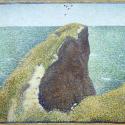
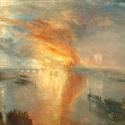

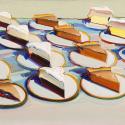



![SEX MONEY RACE RELIGION [2016] by Gilbert and George. Installation shot of Gilbert & George 21ST CENTURY PICTURES Hayward Gallery](/sites/default/files/styles/thumbnail_125_x_125_/public/mastimages/Gilbert%20%26%20George_%2021ST%20CENTURY%20PICTURES.%20SEX%20MONEY%20RACE%20RELIGION%20%5B2016%5D.%20Photo_%20Mark%20Blower.%20Courtesy%20of%20the%20Gilbert%20%26%20George%20and%20the%20Hayward%20Gallery._0.jpg?itok=3oW-Y84i)
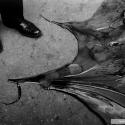
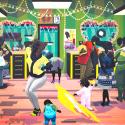
Add comment